- Home
- Will McIntosh
Soft Apocalypse Page 3
Soft Apocalypse Read online
Page 3
I nodded, my eyes filling with tears.
“I’m not saying Sophia’s a bad person,” he said. “Obviously she’s a very good person, trying to do her best. But you have to do what’s best for you.” He stood. “I can see you’re about to need someone to hold you and rock you and tell you everything will be all right, and I’m sure you don’t want that person to be me,” Colin said.
He went over to Ange, squatted beside her and said something. Ange looked over at me, then sprung up and headed my way. I was crying like a baby before she reached me, arms out, ready to enfold me.
“It’s been almost two years,” she said as she held me, “you don’t want to turn around one day and realize ten years have passed, and you’re still waiting by the phone. You’re a wonderful guy. You deserve a whole person, not one you have to share.”
But the whole person I wanted was Sophia.
“After you broke up with Tyler, how long did it take you to get over him?” I asked, speaking into her neck, which was wet with my tears.
“I never got over him. It got less painful, but even now, those emotions come crashing down sometimes, and it’s like we just broke up.”
I think everyone has a Sophia. When Ange first told me about Tyler, who she fell in love with when she was sixteen, she’d said “Don’t get me wrong, I love Cortez, but Tyler, he sunk to my bones.”
When you fall in love, really fall in love, the stakes are so high.
I took a walk down the tracks and called Sophia. She said she couldn’t talk, which meant her husband was there.
“Can you take a walk. I really need to talk.”
She was quiet for a long time. I knew she could hear in my tone, in my plugged up nose, that something was very wrong.
“I know what you’re going to say. I don’t want to hear it.”
“I’m sorry,” I said. “I’m so sorry.”
I heard her close her front door. “Please don’t,” she said. She was crying, which made me cry harder. “You’re the only thing in my life that makes me happy.”
We talked for hours. I said if she was never going to leave him (I could never say his name, I just called him “him”), what was the point? She said she didn’t know what the point was, she didn’t need a point, she just needed to hear my voice every day. I told her we were just torturing ourselves.
In the end, she said she understood, but she still didn’t want me to go. We told each other “I love you” about fifty times. And then I held a dead phone.
You go a little crazy after a breakup; you know you’re a little crazy, that your thinking is all askew and can’t be trusted, but you can’t do anything about it besides wait it out. I’ve learned it’s best not to make any substantive decisions during this time, because they’re mostly going to turn out to be bad ones.
So I followed my tribe, one foot in front of the other, feeling bleak, tortured by guilt at the thought of the pain I was causing Sophia, knowing I could stop it by calling her and saying I was sorry and wanted things back the way they’d been.
We headed toward Vidalia, working rivers along the way with our hydropower collectors, roadsides with our windmills, spread solar blankets whenever we stopped and the sun was out.
“Nietzsche said ‘What doesn’t kill you, makes you stronger,’” Jim said to me as we slogged along another trash-strewn roadside."
“Yeah, right,” I said. “How about radiation?”
Bob Marley came on the portable radio Cortez was carrying. I went over and stabbed the power button as that aching sadness ripped through me. Marley was one of Sophia’s favorites. Cortez looked at me funny, but didn’t say anything. They were all cutting me a wad of slack.
I’d loved Marley long before I met Soph. We used to play it during our high school poker games. That got me thinking of my folks, who put up with our loud late-night poker games in their basement, who had died in the water riots in Arizona. I turned the power back on. She couldn’t have Bob Marley.
Cracks of gunfire sounded in the distance, and a police siren. Or maybe an ambulance siren. It occurred to me that I couldn’t tell the difference. I looked around for Colin. The Winn-Dixie was getting close; I decided there wasn’t enough time to get into the nuances of sirens.
The Winn Dixie was almost empty. Cortez and Jim and I went in—they were less likely to refuse our business if there were only a few of us. The sole woman at the row of checkout counters looked agitated as we pushed open the electric doors, but she didn’t say anything. We set about shopping.
“Hey, what about these?” Cortez said, holding up a package of Oreos.
“We should stick to the list,”Jim said, closing his eyes as he spoke—a classic Jim mannerism. “We can’t afford to buy empty calories.”
Cortez tossed them back on the shelf, huffing. “We’ve got to enjoy ourselves a little, or we might as well be dead.”
A shrill voice up by the registers grabbed our attention. We hurried to the front of the aisle to see what was going on.
The checkout girl was tossing stuff into a cart, and she looked scared as hell.
“Stay!” she shouted, pointing at a woman standing near the entrance.“Don’t come in,just stay!” The woman looked like she was in excruciating pain—she was moaning and gasping for breath, weaving noticeably, her hands dangling loosely at her sides.
“Jesus, what’s wrong with her?” Cortez whispered.
“Here.” The checkout girl pushed the shopping cart toward the woman. It rattled along part of the way, then veered into a cake mix display, knocking boxes to the floor. “Just take it and leave!”
The woman took a flaccid, spastic step toward the cart, then another. It was horrible, the way she walked. Her teeth were gritted in pain, her cheeks wet. She latched onto the cart, used it to steady herself as she jerked slowly, slowly toward the door.
Cortez ran to get the door for her.
“Are you crazy?” checkout girl screamed. “Stay away from her!” Cortez’s sneakers screeched on the linoleum as he stopped short.
“What’s wrong with her?” he asked.
“Just get out of here before I call the police.”
“Fine, fine, we’re going,” I said. “But we need this stuff.” It wasn’t half of what we needed. “Just let us check out first.”
“Twenty bucks. Leave it on the counter and go,” she said without looking into the cart Jim was pushing. Cortez pulled a twenty out of the pocket of his jeans and dropped it on the counter. The checkout girl was looking off to one side, tears in her eyes, biting her bottom lip.
The rest of the tribe was resting in the shade of a Dollar Store.
“We need to get out of here,” Cortez said to them, running ahead of Jim and me. “There’s a virus here. A woman came in, she looked like a zombie—”
“Filthy gypsies! You did this.” A skinny man with long hair and a Confederate flag t-shirt appeared around the corner of the building, from the front lot. He had the same horribly loose walk and agonized expression as the woman in the grocery store. And he had a pistol. My bowels loosened as he lifted it, his hand trembling viciously. Someone screamed.
“Kill you all. Every fucking last…”
The gun dropped from his rubbery grip and clattered to the pavement. He cried out in frustration, glared at us like we were the devil. Then he bent to retrieve the pistol and collapsed. He lay cursing, his nose and cheek bloody from pavement burn.
We ran. Carrie had grown up in Vidalia, and led us out behind the Dollar Store, through a small patch of woods and into a neighborhood. A few streets away there was a railroad track that would get us out of sight in a hurry.
“What was that?” Jeannie said.
“They’re like zombies,” Cortez said. “I swear, they move like zombies in a George Romero film.”
“It’s some sort of neurological disease,” Jim said. “But a highly contagious neurological disease? I’ve never heard of such a thing.”
Through the open window of a little yell
ow house, we heard screaming. They were screams of agony—mindless, full-throated howls.
“This way,” Carrie said, cutting between two houses. Weeds tugging at our ankles, we trotted, humping our packs, Colin and Jeannie bringing up the rear on the bikes.
Across the next street and down a ways was a little park crowded with a dozen people. They were wearing white masks and gloves, and they were filling a freshly dug hole with bodies wrapped in sheets. We cut straight across, running as fast as we could manage.
“Gypsies!” someone shouted from the park. Gunshots cracked. I heard that twanging ricochet sound you always hear in the movies. The railroad tracks were across the next street. We ran along the tracks, into the woods, glancing back and seeing no pursuit. We kept running until we were out of sight of the road.
We pitched camp below the track, then sat in a tight circle in the dark. Everyone was quiet, lost in their own thoughts. A siren keened in the distance.
“We have to stay out of towns as much as possible,” Jeannie said. “That other tribe we camped with out here, they were much better at living in the wilderness than we are. We need better survival skills.”
“That’s not our thing,” Cortez said. “We work the towns. We can’t sell energy to squirrels.”
“I don’t think we can do that much longer. Our contacts are drying up. I think Jeannie’s right,” Colin said.
“There are two worlds now, and that one isn’t ours,” I said. I felt a falling sensation in my stomach. It wasn’t ours any more. It really wasn’t.
“We have to stop buying all our food at 7-Elevens,” Jeannie said. “We have to start buying guns and fishing gear with the money we earn, not cell phone minutes.”
“I’m not paying for the phone,” I said.
“I know,” she said. “I just mean we have to get tougher.”
Tougher. I hated tough people. But she was right; if we didn’t change we were going to die.
It had been a long, shitty day. We climbed into our tents as soon as it was dark.
I felt so utterly alone in my tent, even with my tribe all around me. Sleeping in tents in the woods was so different from sleeping in tents in town. The wild was an alien creature; a stark, silent reminder that there was no one to take care of us, that we were living in a ruthless world that would think nothing of it if we all died tonight. The crickets outside sounded metallic. I wanted to call Sophia so, so badly.
I threw my blanket off and crawled outside. It was too dark to go for a walk, so I stood in the middle of our little camp, staring at the stars through the dark treetops.
“I wouldn’t want to be out there, dating again.” I started a little. Cortez was sitting ten feet away, on a fallen tree trunk at the edge of camp.
“It’s rough,” I said, not really wanting to talk about my dating life with Cortez. Still, I went over and stood near him, not wanting our conversation to wake the others.
“It’s not just that,” Cortez said. “I’ve got the white man’s curse.” He held his hand up, his fingers three inches apart. I didn’t understand. “I was always a nervous wreck the first time I had sex with a woman, because I wondered if she was laughing inside, when she first saw it.”
Then I understood. I stumbled for a reply. “Wow. I can see how that would be nerve-wracking.” Was he saying what I thought he was saying? Could he possibly be telling me something that personal? I wouldn’t tell anyone, not even Colin, if I had a small dick.
And suddenly, I liked Cortez. He would probably risk his life for me if it came down to it. He was part of my tribe. I should cut him the same slack he cut me.
“Yeah, well. We all got our crosses to bear,” he said, standing and brushing the seat of his pants. “Try to get some sleep if you can.”
“Cortez,” I said, holding out my hand. He took it, squeezed it hard. “Good talking to you, man.”
I got up early, when the world was still a little gray. Everyone else was still asleep. I sat on the ground and looked through my photo album, at pictures of when I was a little boy. Mom and Dad on the teacup ride at Disney World, sunburned and laughing; Sis on the front lawn in her purple majorette outfit; me, missing a front tooth, at the plate in t-ball.
A woman hurried past our camp, up on the railroad tracks. She looked too scared to be out for exercise, but she was too clean to be a gypsy, and had no stuff with her.
“Hey!” I called to her quickly receding butt. “You all right?”
She glanced back, jolted to a stop. She stood panting, hands on hips, as if she wasn’t sure if she was all right or not, or maybe she wasn’t sure if she could trust me.
“We’re harmless,” I said, holding up my photo album as if it was proof of this.
She paused another heartbeat, then climbed down the slope to our camp. She was small, with an eager, slightly aggressive look. She stopped about twenty feet from me.
“What are you doing out here by yourself?” I asked.
“Are you coming from Vidalia?” she said. I nodded. “I’m from Vidalia. I’m getting as far away as I can.”
Some of the other tribe members poked their heads out of the tents to see who I was talking to.
She was a doctor. Another doctor in town had tried to pack up and leave when things started getting ugly, and now he was sleeping in the city jail when he wasn’t treating patients. She’d bolted before dawn, taking nothing that might raise suspicion if anyone saw her. She said her name was Eileen.
She told us that the virus acted like polio, but spread like influenza. The victims slowly lost feeling, starting in the extremities. If paralysis reached the torso, they suffocated.
“It’s horrible, you have no idea,” she said. “Half the town has it. Young children and old people usually die. Stronger people survive, but end up paralyzed. People are either leaving town or holing up to avoid being exposed. There aren’t enough people to bring food and water to the infected, so the victims have to go outside to find food and water, until they can’t any more. Then they die of dehydration.”
I poured her half a Styrofoam cup of water, walked it halfway and put it down. Eileen thanked me and retrieved it. She held it with two hands as she drank, to stop the cup from shaking.
“There was nothing I could do,” she said. “I can’t help them! This is not a normal virus; it spreads too fast. It’s got to be engineered.”
“Who would engineer something like that?” Colin asked.
Eileen shrugged.
“Could be insurgents looking to overthrow the government. Or the government,” Jim said.
“Look, can I buy supplies from you? I have cash,” Eileen said.
We sold Eileen some things, and she went on her way.
Around midday we began to hear gunfire—not the occasional shots we’d become used to, but sustained automatic weapons fire. Military gunfire. We looked at each other, confused.
“Oh, jeez,” Colin said. “They’re cleaning out Vidalia.”
I could picture it—soldiers in yellow hazmat suits, going door to door, killing everyone. That’s exactly how this government would deal with the outbreak.
We reached Statesboro by late afternoon. Cortez and Charlie volunteered to try buying supplies at Wal-Mart while the rest of us went downtown to sell energy to some of our reliable trading partners.
Getting downtown meant winding through a series of what used to be middle-class neighborhoods. It was hard to figure out what to call the classes now, though. There was the starving, the almost starving (us), the dirt poor, the poor, and (as there always are) the filthy rich.
We passed a group of kids playing immigration and illegals. The kids playing the illegals jabbered in mock-Spanish as they were handcuffed with plastic six-pack rings and taken away.
A guy in a sweat-drenched t-shirt came out of his garage and stared at us, his arms folded across his chest.
“What do you want here?” he called.
“We’re here to mow your lawn,” Ange said. An old joke, but a few in o
ur tribe laughed anyway.
“Move on, you fucking gypsies, no one wants whatever you’re selling,” the guy shot back. He was wearing those black hipster-doofus glasses that were big fifteen years ago.
Ange gave him the finger.
“When did lawn mower jokes start?” I asked Colin.
“Hmm.” He thought about it. “I’m gonna say the summer of ’19. Really poor people stopped mowing a couple years earlier, but that year was the biggie. I think the first jokes were about watering lawns though—” Colin stopped walking. “Oh shit.”
Two more men had come out of the garage, clutching rifles. One of them tossed an empty beer can into the weeds and stormed up the driveway.
“You think you’re funny?” he said, getting right in Ange’s face, blocking her from continuing. This guy wasn’t wearing glasses; he had muscles, and a swagger. Everything about him screamed “angry
war veteran.”
Ange didn’t say anything.
“Well?” the guy said. “You think you’re funny?” He smacked her across the face, hard.
Barely skipping a beat, Ange spat in his face. From thirty feet away I could see rage light up the guy’s eyes as he wiped a spot just under his eye with the back of his wrist.
“We’re leaving now, we’re leaving now,” I said, edging toward them. “We’re sorry.” My heart raced as the guy turned his glare on me.
“You go right ahead and leave. That’s a smart idea.”
He grabbed Ange’s wrist and yanked. She screamed, dug in her feet, clawed at the fingers clamped to her wrist.
We all ran to help her. The third man took a few quick steps forward, raised his rifle and aimed it at Colin’s chest. Everyone stopped.
The guy with the glasses grabbed Ange’s other flailing arm. They dragged her, screaming, down the driveway and up the concrete stoop. The third guy, a short, bald guy, backed toward the door, pointing his rifle at one of us, then another.
“If you know what’s good for you, you’ll move on,” he said from the top step. He lowered the rifle and followed them into the house.
Inside, Ange screamed.

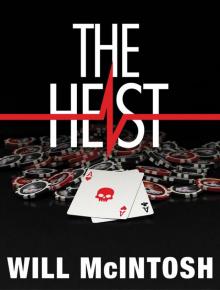 The Heist
The Heist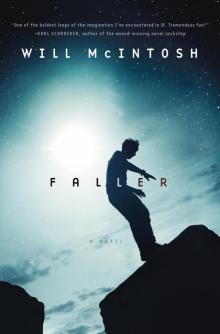 Faller
Faller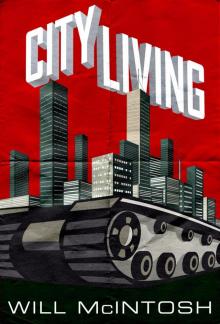 City Living
City Living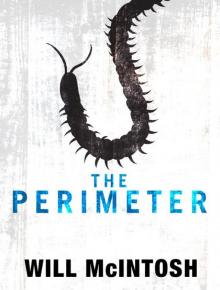 The Perimeter
The Perimeter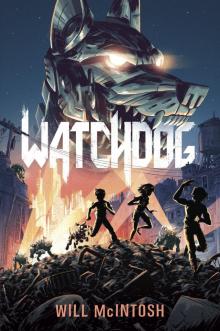 Watchdog
Watchdog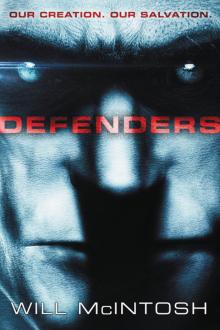 Defenders
Defenders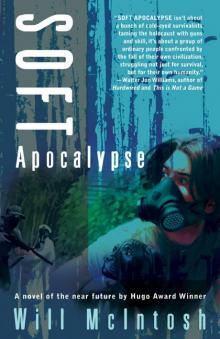 Soft Apocalypse
Soft Apocalypse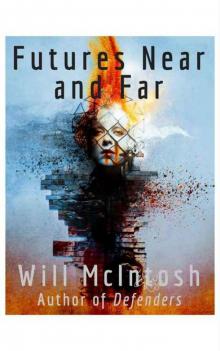 Futures Near and Far
Futures Near and Far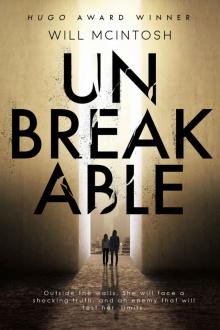 Unbreakable
Unbreakable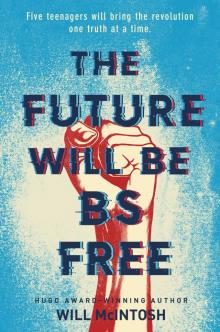 The Future Will Be BS Free
The Future Will Be BS Free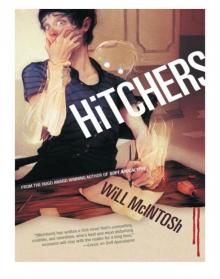 Hitchers
Hitchers Burning Midnight
Burning Midnight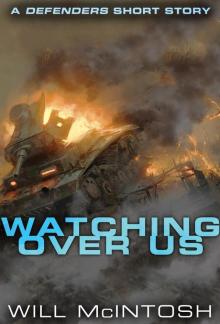 Watching Over Us
Watching Over Us